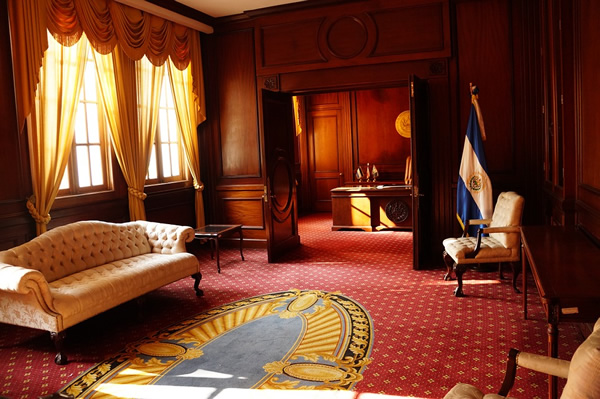Life Working Abroad in the Foreign Service
Varied and Fascinating Work Combined with Mundane Tasks
By Jennifer Smith
 |
The Palacio National in El Salvador. |
Two years, 48,000 faces, and a dozen common stories. As a consular officer in El Salvador I interviewed approximately 200 people a day and over the course of two years spoke with more than 48,000 men, women, and children. My job was to decide whether the applicants planned to return to El Salvador after a short visit to the U.S.
Every day I spoke with elderly farmers from rural El Salvador hoping to visit their children who had emigrated to the U.S. Moments later, it was an executive planning a business trip to New York, or perhaps a hairdresser trying to visit some friends in Houston.
Most Foreign Service officers with the Department of State begin their careers with a 2-year stint, like me, as a consular officer conducting interviews for tourist and immigrant visas. Many move on to other departments such as the economic or political sections after that initial rite of passage.
The Joy of Travel
One of the main attractions of the Foreign Service is the opportunity to travel. Officers generally spend two years at a post for their first two tours; afterwards, they move on to three or four years at each post. Each time a tour comes to a close, officers must bid for new positions. There are embassies and consulates throughout the world, so there are generally openings to suit everyone.
This constant reassignment can be both a blessing and a curse. If you are tired of your current position, chances are good that you can find something more appealing in your next tour. If you are content where you are, however, it can be a difficult transition.
Language Training
The first task of new officers is to learn the language of their assigned country. The State Department provides extensive language training, which lasts anywhere from a few weeks to nine months depending on the difficulty of the language and the officer’s initial proficiency level. For most positions officers are expected to achieve an intermediate level in the language before traveling to post.
Variety of Jobs
Although officers are expected to choose a career track or “cone,” their jobs are not necessarily limited to that area. And even within each cone there are different specialties, depending on the needs of the country. An officer in the economic section might find herself talking to labor unions one day, municipal leaders the next, and the next day taking a field trip to visit a water development project.
Such variety is what many people crave, though it can be overwhelming at times. Often it seems that officers are thrown into work that they know little about and must become experts in a very short time.
A Sheltered World
U.S. embassies are close-knit communities, and, like it or not, the one thing that unites everyone is their very Americanness. Although you may be dying to hang with the locals, it can sometimes be difficult to break out of the sheltered embassy world. That’s not to say that it can’t be done, but it takes some extra effort.
In El Salvador, I refused more applicants’ visas than I issued. That means more than 24,000 Salvadorans know me because I denied them a visa. That in itself is intimidating. I was approached more than once by these applicants, and, although they were extremely courteous, it made me want to shy away from anyone outside my circle of friends.
Government Benefits
In addition to traveling at Uncle Sam’s expense, there are some other perks in the Foreign Service. While at post you receive a regular salary and embassy housing. The State Department picks up the tab for traveling to and from post as well as moving all your belongings. During a 2-year tour you may be allowed one free plane ticket to the U.S. for R&R. Between tours, you receive home leave — which is basically extra vacation time that must be used in the U.S. While at post, you receive not only U.S. federal holidays but a fair number of local holidays as well.
There are also other pay incentives such as danger pay and post differential for some countries. While living in El Salvador, we experienced devastating earthquakes. In an effort to help us cope, the State Department granted an extra R&R to everyone at post and increased our differential pay by 5 percent.
Overall, the State Department can be a fascinating and rewarding place to work, but you must be prepared for some drudgery as well. While my time in El Salvador was intense and I am grateful for the experience, I would not want to repeat it: 48,000 interviews were plenty for me!
Foreign Service Info
For those interested in joining the Foreign Service, www.careers.state.gov offers a wealth of information. The first step is to take the Foreign Service Written Exam. Information about test registration can be found at the website above.Preparation materials can be found on the Foreign Service website. Once you have passed the written exam you will be asked to take the Foreign Service Officer Test Information and Selection Process. A series of prep sessions are conducted in various cities throughout the U.S. each year.
Foreign Service Student internships are also available.
In addition to the information listed on the State Department’s website, two other useful sites give details about the NSEP and Boren awards. The recipients of these scholarships can fulfill their service obligation with the State Department through a program called Foreign Language Fellows. |
JENNIFER SMITH currently lives in San Salvador, El Salvador.
|
